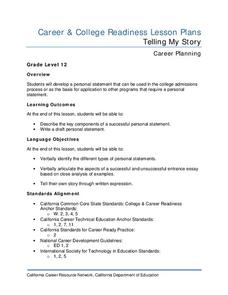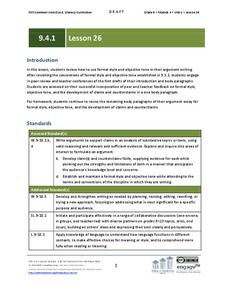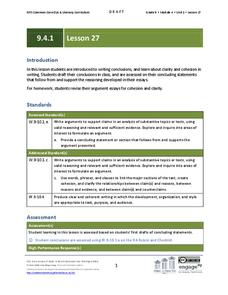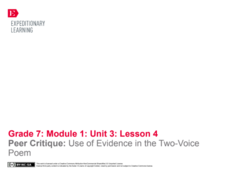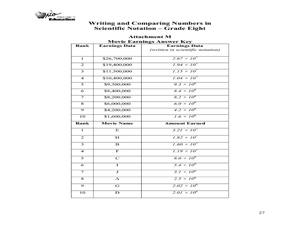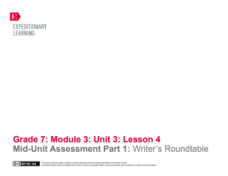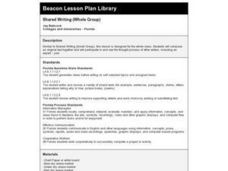EngageNY
Read Expressions in Which Letters Stand for Numbers II
Reading and writing take on a whole different meaning in math class. Young mathematicians learn to read verbal phrases by focusing on operation words. They write equivalent algebraic expressions for both mathematical and contextual...
California Department of Education
Telling My Story
Entrance essays are the ultimate sales pitch! Show your seniors how to market themselves in the first of six college and career readiness lesson plans. Pupils discover the do's and don'ts of writing personal statements through research,...
EngageNY
End of Unit 2 Assessment: Final Draft of Literary Argument Essay
Take the last step in writing a literary argument essay using Bud, Not Buddy by Christopher Paul Curtis in an activity focused on feedback. Using the stars and steps revision method, pupils consider teacher and peer feedback to revise...
Curated OER
Girls Around the World: Communicating Through First-Person Narratives
Teams select a society to investigate and create a chart comparing and contrasting the status of girls in that society with their own. They then craft and illustrate a personal narrative written from the point of view of a girl living in...
Novelinks
The Little Prince: Response to Art Exercise
Depending on your perspective, solitude can be lovely or very, very lonely. Kids take a look at the simple landscape illustrated in Antoine de Saint Éxupery's The Little Prince, and write a short journal entry about their perception of...
Virginia Department of Education
Translate and Evaluate
Translate, evaluate, educate. Discover how to translate and evaluate expressions. Young mathematicians first review words and phrases that indicate operations and learn to write algebraic expressions from verbal descriptions....
EngageNY
Grade 9 ELA Module 4, Unit 1, Lesson 28
As writers continue to revise their argument essays, the focus shifts to editing grammatical conventions, parallel structure, and varying syntax to add interest. After examining model sentences that demonstrate sentence variety, writers...
Poetry4kids
Simile and Metaphor Lesson Plan
Similes and metaphors are the focus of a poetry lesson complete with two exercises. Scholars read poetry excerpts, underline comparative phrases, then identify whether it contains a simile or metaphor. They then write five similes and...
EngageNY
Grade 9 ELA Module 4, Unit 1, Lesson 26
The focus of the day's instructional activity is methods for creating a formal style and objective tone in an argument essay. After examining models, pairs engage in peer review of their essay drafts and continue to revise while...
EngageNY
Grade 9 ELA Module 4, Unit 1, Lesson 27
Crafting a clear and cohesive conclusion to any piece of writing is crucial. An effective conclusion restates the central claim in the introduction, briefly summarizes the supporting claims, and presents a new way of thinking about the...
EngageNY
Peer Critique: Use of Evidence in the Two-Voice Poem
Peer editors review critique expectations before offering feedback on each other's two-voice poems. They record their feedback on peer critique recording forms, and then begin revising their poems.
Curated OER
Putting it Together: Analyzing and Producing Persuasive Text
Young orators demonstrate what they have learned about persuasion and persuasive devices throughout the unit by analyzing a persuasive speech and then crafting their persuasive essays. Class members engage in a role-play exercise, use...
Ohio Department of Education
Writing and Comparing Numbers in Scientific Notation-Grade Eight
Explore scientific notation in this mathematics lesson plan. Young mathematicians explore multiple representations of large number in scientific notation through the use of models, visual representation and expanded form. The lesson plan...
EngageNY
Mid-Unit Assessment Part 1: Writer’s Roundtable
Hear ye, hear ye, it's time for a writer's roundtable! Scholars clarify their thinking about their narrative writing project by engaging in a fishbowl discussion about their plans. As members within the inner circle discuss the topic,...
National Endowment for the Humanities
The Glass Menagerie: Impact of Expressionism
Young scholars are challenged to write a realistic analysis of Tennessee Williams' nonrealistic memory play, The Glass Menagerie. Writers use the evidence gathered on their worksheets to craft an effective thesis and concluding statement...
Anti-Defamation League
Stereotypes of Girls and Women in the Media
A two-part lesson has scholars researching the stereotypes in portraying women and girls in the media and the impact of these representations. To conclude the lesson, participants write a letter of praise to sources that present positive...
Curated OER
A "Fresh" Approach to the District's 6+1 Traits Writing Assessment
One way to assess improvement in writing is to conduct a district-wide assessment program. This resource details the Wisconsin Dells approach to assessing freshmen 6+1 Traits writing. The format could be adapted to any district or used...
Curated OER
Journalism
Students insert raw data about Ad sales into an Excel chart. They use raw data in a letter to local businesses by using the Mail Merge program. They represent data using tables and graphs.
Curated OER
How do we write a report?
Students write a report on a word processing program. In this report lesson, students write about what qualities a hero possesses. They type it on a word processing program and proofread for spelling, grammar, punctuation and more.
Curated OER
Descriptive Writing About a Picture
First graders word process a topic sentence, two detail sentences and a concluding sentence about an image. They import a picture and change the font color of their writing.
Curated OER
Introduction to the Writing Process: Character Description Essays
Students analyze and evaluate an essay and write a character description. In this character description lesson plan, students read and analyze an essay in a teacher-led lecture. Students brainstorm then write a well-developed essay...
Curated OER
Shared Writing (Whole Group)
Students participate in a whole class shared writing activity. They create an original text while examining the thought process of writers.
Curated OER
Writing a Biography - Part Three
Young scholars edit and revise a first draft of an essay which they are in the process of writing. They proofread for grammatical, spelling, and punctuation errors while using their word processing skills.
Curated OER
Technical Writing / Siddhartha
Twelfth graders are introduced to and produce several types of technical writing. They watch a crime video and write a police report, explore websites and draft summary sentences, write a personal vision quest based on "Siddhartha" and...
Other popular searches
- Guided Writing Process
- Descriptive Writing Process
- Teaching the Writing Process
- The Writing Process
- 5 Step Writing Process
- Writing Process Drafting
- Writing Process Lesson Plans
- Writing Process Steps
- Steps of Writing Process
- Four Steps of Writing Process
- Six Trait Writing Process
- Essay Writing Process



